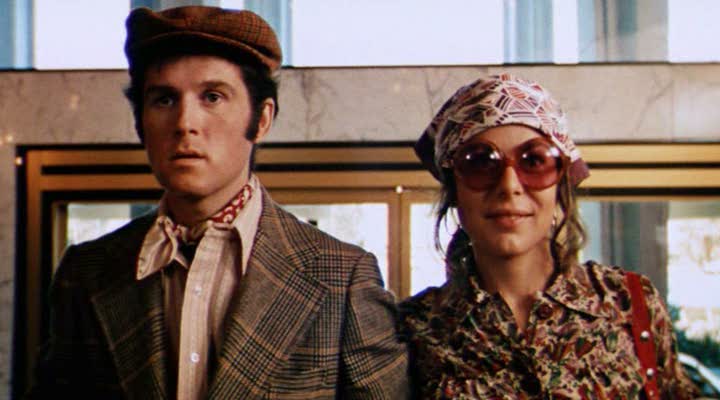In perhaps one of their most beloved skits, improv comedy duo Nichols and May perform what is for some a painfully familiar scene: date night as a young teenager. Alone in a parked car overlooking a lake, two nervous kids navigate an intimate setting with a squirrely hesitancy seen often in the sexually-frustrated American youth. They share deeply philosophical thoughts (“You look at that lake out there, you know, and you think, you know, like, what is it?”), squirm in their seats, and eventually, painfully – oh so painfully – share a kiss. May is all elbows and chin. Nichols looks as if he’s holding on for dear life, eyes wide and pleading for help that will not come. The crowd roars with laughter and a cringe-inducing understanding of what it means to navigate a date with a crush and experience – or, at least, try to – romantic relationships.
Elaine May went on to direct four narrative films — a much-anticipated fifth film, starring Dakota Johnson, is presumably on the way — each of them dryly hilarious in their own right. Two of them stand out: her directorial debut and cult favorite A New Leaf (1971) and the later remade The Heartbreak Kid (1972). Both examine a topic frequently improvised upon in her early days as half of a comedy duo: the uncertain and sometimes rocky terrain between two people in or pursuing a romantic relationship. These films are romantic comedies of a different breed: they are unrelenting but not uncaring entries in a genre otherwise full of attractive couples facing divisive but humorous issues, typically tied up in happily-ever-afters. These two films are not that. Completely revisionist in their own right, they share an initially misanthropic worldview, man-child protagonists, and aloof-yet-lovable female counterparts. In their endings, May offers them a stark humanity that is more relatable than most rom-coms we see. Their themes and their starring performances make these fun examples of what a romantic comedy can be, and distinguish May as a deeply empathetic, hilarious, and thoroughly human director.
The romantic comedy is a beloved genre defined by its timeless narrative conventions: boy meets girl (or person meets person) and they fall in love. That couple eventually experiences a complication that raises the stakes and briefly causes separation, only for them to realize that they’re better together, and to happily reunite in the end. This isn’t to say that variations aren’t welcome, as they are increasingly so. Overall, though, in 1970, a year before May’s directorial debut premiered, the conventions within genre filmmaking were more typically maintained. The classic Hollywood model of rom-com has proved to be the most culturally influential and financially successful. It can be assumed, then, that in this climate May became familiar with the genre, and saw room for variations and darkly comedic revisions.
Released ten years after the disbandment of Nichols and May, A New Leaf stars nationally beloved grump Walter Matthau as Henry Graham; trust fund baby, social recluse, and utterly ineligible bachelor. Suddenly informed that his fortune is mere weeks away from running out, he must find a bride with the funds to support his luxurious lifestyle. He finds Henrietta Lowell, a fumbling botany professor with a substantial fortune and no benefactors. Despite Henry’s disgust with her cheap taste in wine – “…Mogen David extra heavy Malaga wine, with soda water and lime juice?” – and poor table manners – he has to literally vacuum crumbs from her lap after one dinner – they marry. He plans to murder her for the inheritance money, but when Henrietta discovers a true species of fern and names it after him, Henry soon changes his mind. He even goes to the trouble to save her in the climax of the film when she begins to drown. In the end, he grapples with his emotions and realizes he’s gained all that he wanted, certainly monetarily, and maybe more. Perhaps a genuine love and connection, that he didn’t know he was lacking in the first place.

Image courtesy of Paramount Pictures
This story flips the desperate “gold-digger” trope on its head. It is the leading man who is without a profession, money, charm, or power. Henrietta — in a physically hilarious, lovingly-crafted, and ultimately heartwarming performance by May herself – is highly intelligent but debilitatingly awkward. She is not conventionally beautiful, nor especially good with words or motor skills. Despite this, all at once, she is the one with the power, and also the conquest, though certainly not in the traditional sense we’ve seen in other rom-coms. Henry’s pursuit is not that of love, but greed. He is deterred from murdering Henrietta when she makes a heartfelt gesture, while also feeding his ego. Henry realizes he has made the right decision, or at least one that turned out better than expected.
May’s next feature, The Heartbreak Kid, is considerably more unkind to its protagonist. Another favorite of American comedy, Charles Grodin, stars as Lenny, who has just married Lila – played by May’s own daughter, Jeannie Berlin – rather hastily, presumably after hearing her desire to remain chaste until marriage. En route to their honeymoon, Lenny begins to question his nuptials as he grows increasingly annoyed with his new wife. She gets more double egg salad sandwich on her face than in her mouth, tugs cloyingly on his chest hair, and gobbles a Mars bar in a moment of post-coital bliss – or rather, annoyance – for Lenny. On their first day in Florida, after blowing off repeated suggestions to please put sunscreen on, she is stuck in the hotel room, badly burnt, groaning and salved up like some sort of nasally, coastal mummy. Lenny is further discontented with his wife when he meets Minnesotan blonde, waspy shiksa Kelly Corcoran (Cybil Shephard) on the beach. She flirts with him relentlessly, but cruelly, patronizingly. At dinner on their last night, he tells Lila he is leaving her, and, in the film’s most memorable scene, she is reduced to hysterics in front of the patrons of a seafood restaurant.

Image courtesy of 20th Century Fox
Lenny gets what he wants, or at least what he thinks he wants. He ends up marrying the beautiful Kelly with the rich family after tracking her down at her college campus and practically stalking her and harassing her family. At their reception, after exhausting even a pair of kids with his insipid small talk, he suddenly hears a Carpenters song that he and Lila thought of as their song. He briefly remembers her off-tune but ultimately charming cadence while singing it in the car on their way to their honeymoon. In a moment that feels heavily inspired by The Graduate – a film directed five years previously by Mike Nichols, the other half of Nichols and May – Lenny sits in silence, a forlorn and distant look in his eyes in a steady, lengthy shot. In this final moment, he is finally forced to sit with his decisions. Even after getting what he had thought was his dream girl, Lenny remains deeply unsatisfied, and both himself and the viewer simultaneously realize that maybe nothing will ever fill the longing that he believed a conventionally attractive, affluent wife could.
In both films, the audience is most closely narratively aligned with the male protagonists, who both share a number of negative character traits – emotional shallowness, extreme narcissism, and an almost disturbing anti-social attitude – and are generally disliked by the characters around them. Henry is perceived as deeply untrustworthy and materialistic, and fairly so. Kelly’s family is deeply put off by Lenny’s relentless and creepy pursuit of their daughter, especially when they find out he left his three-day-long marriage for her. In a genre where we are expected to root for the protagonists, we are given two total duds. Though deeply and thoroughly unlikeable, in the end, we can’t help but find ourselves empathizing with them. We are touched by Henry’s come-to-Jesus moment with his namesake fern. We find ourselves just as puzzled and unsatisfied as Lenny is at his reception.
These films also share a similar character type in their leading women: a loveably clumsy or otherwise unwieldy, peculiar woman who is unapologetically herself, simply because she is too unique to be able to pretend to be anybody else, not that the thought would even enter her mind. Played first by May, then by her daughter, it is especially interesting and important to note that these women are framed by the protagonist-centric, and therefore, male-centric, narrative to be a bit dumb in their clumsiness; an unassuming, dead weight to their spouses. But in the end, the women come out on top: Henrietta’s extreme intelligence and kindness are cherished by an initially-reluctant husband and Lila, wailing and nauseous in her final moments on screen, can at least rest assured eventually that it wasn’t her who was the problem. Moreover, she dodged a bullet with self-obsessed goofball Lenny. Both pictures, however unkind or cynical initially, are keenly emotionally intelligent in their endings. They are not the traditional happily ever afters, but do offer a solid psychological resolution for the viewer and characters alike, and may more closely reflect real-life relationships compared to the traditional romantic comedy.

Image courtesy of 20th Century Fox
Elaine May has a distinct directorial voice that is as scathing as it is soothing, as pessimistic as it is empathetic. Her work is timeless, and her new film Crackpot, long-awaited and indefinitely delayed by the pandemic, will be May’s first narrative film in more than three decades. If it is anything like her previous films about love and relationships, it will surely be another on-the-nose social commentary that is as caustic as it is kind.


Leave a comment